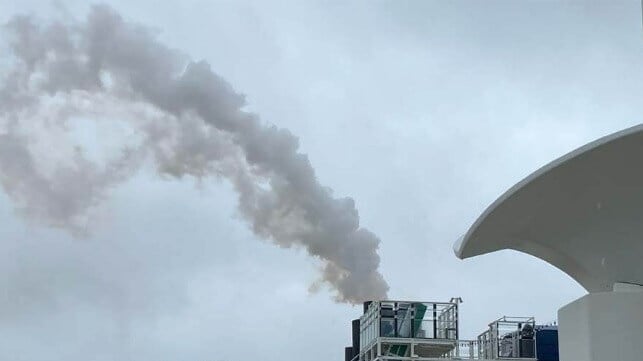Regional Ban on Scrubber Wash Among Environmental Steps Adopted by OSPAR

Representatives from 16 countries meeting in Virgo, Spain, announced today, June 27, that they had adopted the first regional ban on the discharge of scrubber wash water among a series of new environmental actions. NGOs hailed the action, which expands on localized bans, but said the ministers failed to take the action far enough to the full extent of territorial seas.
Ministers expressed serious concern about hazardous discharges from all types of exhaust gas cleaning systems aboard ships. Activists such as the NGO Seas at Risk contend scrubbers, which use seawater to wash sulfur from a vessel’s exhaust, discharge wash that contains contaminants including polycyclic aromatic hydrocarbons and heavy metals. The NGO was advocating for a total ban on the discharge into all coastal waters.
“Turning air pollution into ocean pollution is not an acceptable trade-off,” said Maarten Verdaasdonk, Project Manager, North Sea Foundation. “It is vital that all OSPAR Members support the proposal to extend the ban to territorial waters, especially as cleaner, widely available alternatives exist. Such a ban will improve water quality and protect marine life in the coastal areas of the entire North-East Atlantic.”
The members adopted a two-stage ban starting with the wash from open-loop scrubbers starting in July 2027 for the region known as the North-East Atlantic, covering the coastline from Spain to Norway and west to Greenland. Further, while closed-loop scrubbers produce less volume, it however also contain hazardous material, so the ministers adopted a discharge ban on this wash water to be in effect by January 2029.
The ban as adopted, however, only covers internal waters and the areas in and around ports. The NGO wanted the ban on all territorial waters within the 12 nautical mile range from the coastline. OSPAR members agreed to discuss the range of the ban in 2027 after receiving further studies on the impact in territorial seas.
The ban is seen as a critical action as the shipping industry looks to all methods to extend the life of ships and meet emerging environmental regulations. With the strict emissions regulations already adopted, many ships installed scrubbers to continue the use of less expensive sulfur fuels, and many new ships are being built with a range of exhaust wash systems.
The minister took other actions, including expanding the organization's maritime area by over 2.5 million square kilometers. They are going to include the waters of Macaronesia, the Azores, Madeira, and the Canary Islands. They said it would bring additional biodiversity-rich areas under OSPAR protection while recognizing the importance of regional cooperation.

that matters most
Get the latest maritime news delivered to your inbox daily.
Other decisions included new actions on marine litter, a ban on plastic pollution from pontoons and buoys, and a new regional plan on underwater noise. They also moved to strengthen protection in the Arctic, including beginning to identify potential Marine Protected Areas. They also reiterated their 1998 statement not to treat the seas as a dumping ground and reiterated the requirement to remove disused offshore installations.
OSPAR was formed in the 1970s coming from UN-sponsored conventions in Oslo and Paris to reduce marine pollution. The member countries include Belgium, Denmark, Finland, France, Germany, Iceland, Ireland, Luxembourg, Netherlands, Norway, Portugal, Spain, Sweden, Switzerland, and the United Kingdom.
